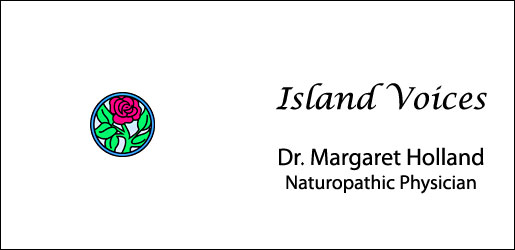Dr. Margret Holland January 2009
Current Article ∙ Archive ∙ Back to Island Voices
Reactional Mode 2
A Brief Description for Defining Health and Disease
By Dr. Margret Holland, B.Sc., N.D.
This month we will continue to explore the concept of reactional modes with the end goal of being better able to ascertain which treatment protocols will best benefit an individual during times of illness.
Reactional Mode 2 still falls within the category of illnesses where there is no lesional change in the body. The disease state is one of functional change only. Lab work is often normal, yet the patient knows that something is not quite right. If you recall RM 1 was called the hyper reactive state, whereas RM 2 is referred to as the hypo reactive state. In RM 2, the body’s reaction to stress and stimulation is insufficient to overcome the disease state.
These patients tend to be of a calm disposition and become easily fatigued. They need a lot of sleep in order to feel restored. They describe their energy as being at its best in the morning on waking and slowly become more tired as the day progresses. They tend to have problems with concentration, often complaining of a “foggy brain”. They may be overweight.
The keynote of RM 2 patients is frequent infections. In children, there may be failure to thrive with slow bone growth. In adults there may be, hypothyroidism, painful menses with reduced blood flow, osteoporosis, scoliosis and progressive chronic rheumatism. Acne will be cystic with much redness and pain of the lesions. Constipation is another common complaint in RM 2 patients.
It is now obvious that RM 1 and RM 2 patients cannot be given the same treatment protocol for similar illnesses. Constipation in RM 1 would require herbs that reduce heat and are more calming to the patient in order to overcome the excessive nature of their condition. A similar complaint in a patient of RM 2 would require warming and stimulating herbs in order to provide them with the energy they need to move their bowels. If the condition is not properly assessed the condition would actually be aggravated by an inappropriate selection of therapy.
In general RM 1 patients require detoxification protocols to remove the excess of irritants in their system. RM 2 patients have an inherent deficiency and requesting their body to do the work of detoxification, when they already lack the energy to do even minimal tasks, would further deplete them.
Next month we will explore RM 3, which falls within the category of illnesses with lesional changes.
Dr. Holland can be reached at (250) 752-2732 or #3-702 Memorial Avenue, PO Box 564, Qualicum Beach, BC. V9K 1T1.
For a consultation, please call me at 752-2732.



![holland-4colourcircle[1]](http://seniors101.ca/wp-content/uploads/2011/05/holland-4colourcircle12.jpg)